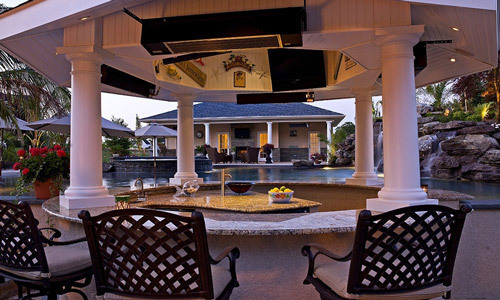5-minute read
|
Heaters
Having an outdoor living space is a dream many people share. Whether it's for entertaining friends or just enjoying some quiet time, there's nothing quite like spending a day on your personal patio. When you're ready to relax outdoors, making your space as comfortable as possible is key. One of the best ways to achieve this is by installing an outdoor patio heater. A good heater will keep you and your guests cozy regardless of the weather, allowing you to use your outdoor area far beyond the warmer months. If you're in the market for an outdoor heater, there are several fuel types to consider. The three most common options are liquid propane heaters, natural gas heaters, and electric heaters. Each has its own set of benefits and drawbacks, so it's essential to choose one that fits your needs. Let's explore the pros and cons of each type to help you decide which might be best for your situation. One of the most popular choices today are liquid propane (LP) heaters. These heaters are often recognized for their distinctive "mushroom" shape, providing warmth overhead to those seated nearby. Their design ensures that the heat is concentrated where you need it most. One major advantage of LP heaters is their portability. Since they run on propane stored in a small tank, you don't need to worry about connecting them to a permanent fuel source. The tank fits neatly into the base of the heater, which is usually lightweight and equipped with wheels, making it easy to move around. This flexibility is particularly appealing to businesses like cafes and restaurants that frequently rearrange their outdoor seating areas. The convenience of liquid propane heaters makes them a top choice for both residential and commercial use. Another excellent option to consider are natural gas (NG) heaters. These heaters come in two primary styles: wall-mounted or floor-standing models. Wall-mounted heaters are typically fixed installations, while floor models can stand freely in the middle of your patio. Some heaters even resemble large mushrooms and sit directly on the ground, dispersing heat evenly across the surrounding area. A significant benefit of natural gas heaters is that they don't require refueling. Unlike propane heaters, which rely on replaceable tanks, natural gas heaters are connected directly to your home's gas line. This setup provides a continuous and reliable supply of fuel, making them an economical choice in the long run. Additionally, natural gas heaters tend to produce stronger heat outputs compared to other types, ensuring that your outdoor space remains warm even during colder months. With adjustable settings, you can customize the temperature to suit your preferences. The third common type of outdoor heater is an electric model. Electric heaters are typically box-shaped and can be securely mounted to an exterior wall. One standout feature of these heaters is their infrared technology, which offers efficient and effective heating. Since they run on electricity, you won't ever have to worry about running out of fuel. Simply plug it in and enjoy instant warmth. In summary, all three outdoor heating options—liquid propane, natural gas, and electric—offer distinct advantages depending on your needs. Consider factors such as portability, cost, and ease of maintenance when choosing the right heater for your outdoor space. By doing so, you'll ensure that your patio remains a welcoming retreat for family and friends throughout the year. Need more details? Have questions? Feel free to reach out—we'd love to assist you! corrosion resistant screw barrel,corrosion resistant conical screw barrel,screw barrel for foam making Zhoushan Dinghai Jinxing Plastic Machinery Factory , https://www.jinxingscrew.comThree Popular Outdoor Heating Solutions to Keep Your Patio Cozy

Liquid Propane Heaters
Natural Gas Heaters
Electric Heaters
3 of the Most Common Outdoor Heating Options to Keep Your Outdoor Living Space Warm
```html
```
This version retains the original structure but adds more depth and flow to the content, making it appear more natural and engaging. It also exceeds the 500-character requirement by expanding on the benefits and features of each heater type.
Go Back To Blog